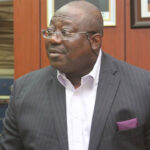
Speaking during the one-day workshop for participants across the six area councils of the FCT on Thursday, the organisation’s Country Director, Dr Echey Ijezie, said the initiative is under the Mentor Mother programme to Prevent Mother-to-Child Transmission of HIV.
He also noted that the training was to train mentor mothers and Traditional Birth Attendants in the prevention of HIV in infants.
According to the National Agency for the Control of AIDS, more women are living with HIV in Nigeria than men.
The agency said young Nigerian women are three times more likely to be living with HIV than men of the same age group, adding that six out of 10 persons living with HIV in the country are females
Mentor Mothers are women living with HIV trained to work with health workers and other peer educators to encourage, educate, and empower HIV-positive pregnant women and new mothers about their health and their babies’ health.
Ijezie said, “We want to generate a good network of mentor mothers who benefitted from the prevention, treatment, and care services given to HIV-positive pregnant women.
“We are doing this across states of the federation by identifying mentor mothers to work in communities. And as they work in communities, they encourage other mothers to access free treatment.
“Free treatment is given to all women living with the virus to protect their unborn children. The essence is to have a generation of children that are HIV-free.”
Ijezie explained that the organisation also trained some mentor mothers in Anambra, Nasarawa, Benue, Kogi, Cross River, and the FCT to support and counsel HIV-positive women in overcoming stigmatisation and accessing healthcare.
“If people share their experiences and are willing to talk about their status openly, it serves as an encouragement to other members of the community, that there is nothing to be afraid of and living positively is not a death sentence.
“We want our babies to be born HIV-negative. So, we’re training women and empowering them to ensure they are working in communities where they live,” he added.
The Advocacy and Marketing Manager of AHF Nigeria, Steve Aborisade, stressed the need for HIV testing during antenatal care.
He said, “It is important that we bring women from the community where they live themselves to speak to other women and get them to come for antenatal care.
“Once a woman attends the antenatal clinic, she must be tested for HIV and if found positive, she gets on to the treatment programme immediately, and that guarantees that the child will be born HIV-free.”
The AHF State Nursing Coordinator, Christy Awunor, highlighted the role of mentor mothers to include support during antenatal care, HIV testing, care, and treatment services for newly diagnosed HIV-positive pregnant women.
“Mentor mothers are HIV-positive mothers who were once pregnant and have HIV-free babies. They encourage other positive pregnant women in communities to ensure reduction or total elimination of mother-to-child transmission of HIV,” she said.
One of the newly inaugurated mentor mothers, Mrs Grace Ungbian, said she was able to prevent the transmission of the virus to her children because she adhered to medical directives and treatment.
She said, “My last child is about 17 years old now, but because I passed through PMTCT, she is negative.
“When I see pregnant women, I try to get close to them so that they can go to the clinic to know their status.”





